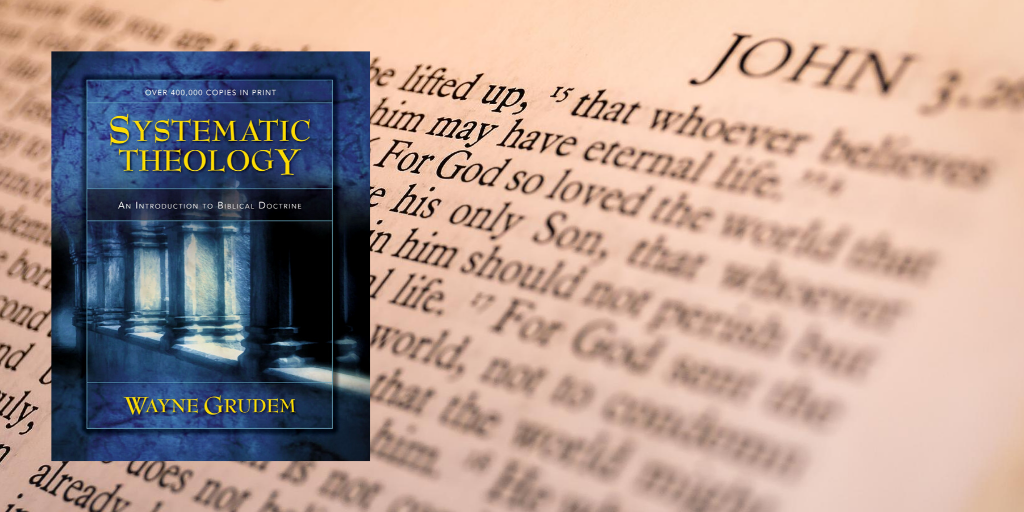Reading Systematic Theology with Wayne Grudem – Why does God want us to pray? How can we pray effectively?
This post is part of a 50+ post series from the classic work by Wayne Grudem (PhD, Cambridge), Systematic Theology: An Introduction to Biblical Doctrine. The aim of each post is to provide an overview of each chapter in the book and related resources for each topic.
Synopsis of Chapter
In this chapter on prayer, Wayne Grudem discusses what prayer is, why God wants us to pray, and several aspects of effective prayer.
Grudem defines prayer as “personal communication with God.” Though this is a simple definition, there is much implied in how one communicates with God from a biblical perspective. For instance, for one to be effective in prayer a person should pray in accordance with God’s will, while confessing sins, forgiving other people, and with thanksgiving. Grudem does not give a formula for prayer, but provides a framework for how a Christian should communicate with God even while trusting in his sovereignty.
Why Pray?
Prayer is personal communication with God. But why pray?
The Bible stresses the importance of dependence on God in prayer. For one, God knows what we need before we ask him (Matthew 6:8). When we pray, we demonstrate our trust in God to fulfill our needs he already knows about. Second, prayer demonstrates our belief in a God who is a good father to us (Matthew 6:9). He gives us good gifts (Luke 11:9-11) and he listens to our concerns (Mark 11:24).
How Prayer Works?
So how does prayer work? Most importantly, prayer only works because of Jesus. The Apostle Paul tells us, “For there is one God, and there is one mediator between God and men, the man Christ Jesus.” (1 Timothy 2:5) We would not be able to pray without the mediating work of Jesus. He paved the road for us to communicate with God through his death, burial, and resurrection.
Prayer also seems to affect the way God acts. James tells us, “you do not have because you do not ask.” (James 4:2c) That means we do not have certain things because we didn’t pray for them. As a corollary, we would have certain things if we had prayed for them.
Thirdly, prayer works because we ask on behalf of Christ’s kingdom. Jesus is building his kingdom on earth. We help build Jesus’ kingdom when we offer prayers in his authority – or “in his name.” (John 16:23-24) Christ gave us authority to pray in his name so that his work would continue in the world. That’s one of the reasons it works.
Fourthly, the Holy Spirit also helps us in our prayer. Paul wrote:
“Likewise the Spirit helps us in our weakness. For we do not know what to pray for as we ought, but the Spirit himself intercedes for us with groanings too deep for words. 27 And he who searches hearts knows what is the mind of the Spirit, because the Spirit intercedes for the saints according to the will of God.” (Romans 8:26-27)
Though it may seem strange for the Holy Spirit to use “groanings” in prayer, he does. But it’s not just in Romans. Jude also talks about praying “in the Holy Spirit.” (Jude 20). When we truly pray, the Holy Spirit prays with us.
Considerations in Effective Prayer
There are a few things to consider in order for us to be effective in prayer.
- According to God’s Will
If we pray according to God’s will, he will hear us (1 John 5:14-15). We can pray according to God’s will when we understand Scripture (John 15:7). We can also know God’s will when he gives us wisdom (James 1:5-8) - Praying with Faith
Jesus told us if we pray believing we have received our request (Mark 11:24). And this faith is an “an assurance of things hoped for” (Hebrews 11:1). So faith, or a settled assurance, is a component to effective prayer. - Obedience
God doesn’t listen to the prayers of the disobedient. The Psalmist declared, “If I had cherished iniquity in my heart, the LORD would not have listened.” (Psalm 66:18) God wants his people to be holy and will not hear those who spurn his instruction. - Confession of Sins
Confession of sins should be a daily practice (Matthew 6:12). When that happens, the assurance of the forgiveness of sins becomes more real. Those who regularly confess their sins seem to have more effective prayers. - Forgiving Others
In the same way we ask God for forgiveness, we should also forgive other people. (Matthew 6:14-15). By forgiving other people of their sins against us, we are demonstrating that we ourselves are also forgiven. Forgiveness directly helps our communication with God. - Humility
God gives grace to the humble (James 4:6). On the other hand, God opposes the proud (1 Peter 5:5). In order to effectively communicate with God in prayer, we must be humble and have an appropriate opinion about ourselves. - Continuing in Prayer Over Time
Effective prayer is often prayed over time. Jesus wanted us “always to pray and not lose heart” (Luke 18:1). Sometimes we do not receive things because we stop praying for them. - Praying Earnestly
Intense prayers were modeled by Chirst (Hebrews 5:7). When we pray earnestly and fervently, our prayers are often more effective. - Waiting on the Lord
Effective prayer waits on the Lord. David encouraged his hearers to “Wait for the LORD; be strong, and let your heart take courage; wait for the LORD!” (Psalm 27:14). We don’t always get what we’re praying for immediately. Some prayers require waiting. - Praying in Private
Private prayers can also be effective. Jesus wanted his followers to pray in secret. The act of praying in secret was the means for receiving what was requested (Matthew 6:6). - Praying With Others
But all of our prayers should not be in private. Sometimes, we are to pray with others as modeled in the Old Testament (1 Kings 8:22-53) and in the Lord’s Prayer (Matthew 6:11-13). Corporate prayers can be effective. - Fasting
Prayer is often connected to fasting in the Bible. Answered, or effective prayer is also connected to fasting (Nehemiah 1:14, Acts 13:2). Prayers that are effective seem to be buoyed by fasting.
Conclusion: God’s Sovereignty in Prayer
Prayer is a wonderful privilege. It works because of Christ and his purposes in the church. There are even principles for effective, biblical prayer. But these principles are no guarantee that we will receive everything we ask for. God is still God. He will decide what prayers he will honor according to his secret will.
Some of our prayers are not answered immediately. Some prayers seem to not be answered at all. But that does not negate our joyous duty to bring our requests before the Lord while depending on him. This is part of the mystery of the Christian experience. We pray, but God is ultimately in control. And even if it seems our prayer was unanswered we should believe that he will turn out the situation for good (Romans 8:28)
“Since then we have a great high priest who has passed through the heavens, Jesus, the Son of God, let us hold fast our confession. 15 For we do not have a high priest who is unable to sympathize with our weaknesses, but one who in every respect has been tempted as we are, yet without sin. 16 Let us then with confidence draw near to the throne of grace, that we may receive mercy and find grace to help in time of need.” (Hebrews 4:14-16)
Special Terms
- faith
- “in Jesus name”
- prayer
- waiting for the Lord
Resources: Wayne Grudem
- Wayne Grudem: Book: Systematic Theology: An Introduction to Biblical Doctrine
- Wayne Grudem: 148 Lectures on Systematic Theology
Related Resources
- OpenBible.info: Verses on Prayer
- Monergism: Theology of Prayer (multiple authors)
- Jonathan Parnell: The Main Ingredient in Effective Prayer
- RC Sproul: If God Is Sovereign, Why Pray?








